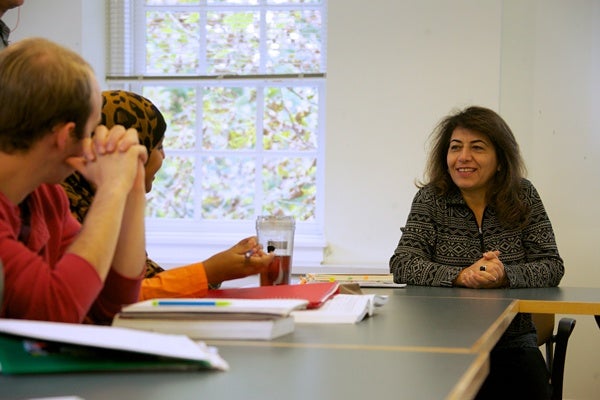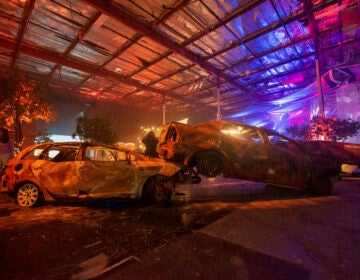Turmoil of war, memories of peace animate work of poet from Baghdad
Dunya Mikhail is generally known as a war poet. The native of Baghdad came of age during the Iran-Iraq war, one of the longest conflicts of the 20th century. Her memories are a volatile mixture of art, literature, and war. She is visiting students in an Arabic language class at Bryn Mawr University.
Dunya Mikhail is generally known as a war poet. The native of Baghdad came of age during the Iran-Iraq war, one of the longest conflicts of the 20th century. Her memories are a volatile mixture of art, literature, and war.
“My home was a peaceful home, my family,” said Mikhail, during a break from talking with students in an Arabic language class at Bryn Mawr College. “And I was seeing friends dying, boys growing up and going to the front as soldiers, coming with uniforms and the boots. The explosions. You walk to school next to the walls. There was fear. How can you avoid writing about something that was living with you?”
“I mean, they say you survive a war, but the war also survives in your memory,” said Mikhail. “It’s the true survivor among us.”
Mikhail does not shrink from war poetry, but neither does she entirely embrace it. She describes going to college in Baghdad as a time of great personal transformation and discovery, filled with art, literature, and friends.
“We argued about Shakespeare and the chickpeas from the street vendors,” she writes in “Diary of a Wave Outside the Sea.”
“Sometimes we walked to the English consul to borrow books and movies, and to drink tea and coffee in their fantastic garden, where couples relax under the shade trees.”
Conscripted as a demonstrator
The Iran-Iraq war could never be ignored. Students were forcibly pressed to participate in street demonstrations, sometimes rallying for causes that couldn’t be further from the minds of Mikhail and her friends.
“People here in America, they watch TV and see these demonstrations but they don’t know these people are taken. They don’t go by themselves. Only in the front line are the real ones,” said Mikhail. “In the back, I would walk and talk about paintings and stuff like that. Or joke. Then we slip away.”
After college, she worked as an editor at a Baghdad newspaper and wrote poetry on the side. Mikhail masked her poems with metaphors, symbols and mythological references to avoid government censors.
Eventually, out of fear of punishment for her writing, she thought about running away to America. She wanted to postpone her flight a few weeks, until after her brother’s wedding.
“‘Just go,'” Mikhail remembers her brother saying to her. “‘I’ll send you a videotape.'”
That was 15 years ago. She settled in Michigan, became a U.S. citizen, and started teaching Arabic at colleges. She began writing about Iraq again, but this time from a distance, and more directly, without the symbolism and metaphors she felt she needed before.
“A friend of mine sent an email: ‘Dunya, how come you were writing better before?'” said Mikhail. “He loves those metaphors, it serves the poetry. But if you are a serious writer, you don’t want that as a shield. You want it when you want it.”
The resulting book, “Diary of a Wave Outside the Sea,” combined poems written in Iraq with autobiographical prose composed eight years later in America. The title itself is a small poem of emigration.
A wave breaking free
Traditional Iraqi poetry has strict formats, which do not allow for structural play.
“We have 16 forms of writing, called Bahr,” said Mikhail. “Bahr also means ‘seas.’ That’s why this title, ‘Diary of a Wave Outside the Sea,’ has two meanings: the sea, meaning the society or environment that you are out of now, but also the sea, which is the rule of classical form. But you are out of it. You are not following it.”
In 2005, Mikhail has won the PEN Translation Prize for “The War Works Hard,” and the U.N. Human Rights Award for Freedom of Writing in 2001. At an evening event at Bryn Mawr College Wednesday, she will read pieces of a yet-unpublished manuscript of poems loosely based on “The Arabian Nights.” In that classic tale, an imprisoned woman stays alive by entertaining a murderous king with 1,001 stories, one every night.
“My niece, I was thinking of her,” said Mikhail. “She was kidnapped. We never knew what happened to her, or if she survived or not. Or where she is, or not. So these poems are ‘The Iraqi Nights.'”
Editor’s Note: Mikhail says “The Iraqi Nights” is under consideration by her publisher New Directions. In a previous version of this story, New Directions was identified incorrectly.
WHYY is your source for fact-based, in-depth journalism and information. As a nonprofit organization, we rely on financial support from readers like you. Please give today.







